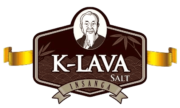Unlock the Wellness by Exploring the Remarkable Health Benefits of Bamboo Salt
In the quest for holistic health and well-being, the path often leads us back to nature’s age-old secrets. Among these hidden gems, bamboo salt stands as an extraordinary revelation, a fusion of ancient wisdom and modern curiosity.
This magical ingredient transcends its culinary origins, offering a gateway to potential healing and vitality. Whether you’re yearning for a wow feel on your skin or seeking a natural remedy to address even life-threatening ailments, rest assured, bamboo salt has got you covered.
But how did it originate initially, what life area does it serve, and why is it the most effective remedy so far? Worry not; all your queries will be answered shortly.
So, stay tuned till the end to uncover the secrets.

The bamboo salt’s (Jukyeom) origins unfolded a millennium ago when Korean healers harnessed their wisdom to craft a remedy tailored to combat life-threatening illnesses.
The story begins with carefully selecting bamboo, an abundant plant in the Korean landscape. This versatile material is not only used for its sturdy exterior but also serves as a medium for infusing essential minerals.
The process involves carefully sealing bamboo tubes with sea salt to create a protective cocoon. These prepared tubes are then subjected to an intense roasting process, often within a clay kiln, where the magic of transformation takes place.
As the tubes are heated to high temperatures (1000 to 1500 °C), the bamboo and sea salt blend their properties, resulting in a fusion of mineral-rich elements. The minerals from both sources intermingle, bestowing bamboo salt with a unique profile beyond mere sodium chloride.
Previously, people used to repeat the procedure 2 to 3 times, but now it is practiced 3 to 9 times.

Why is Bamboo Salt Baked 9 Times?
Have you ever wondered why bamboo salt goes through not just one or two but a whopping nine rounds of baking? There’s a fascinating reason behind this intricate process, and it’s all about unlocking the hidden potential of this unique substance.
The journey of bamboo salt takes an interesting turn when it enters the kiln. Each baking session isn’t just a random step but a deliberate act that enhances its quality.
During each roasting, the bamboo salt undergoes a transformation. It’s like the substance is refined, its properties intensifying with every round. The intense heat creates a composition of reactions within the bamboo salt, leading to changes in color, texture, and even mineral composition. Each successive baking accumulates these changes, resulting in a final product uniquely rich in minerals and potential health benefits.
Moreover, the number nine isn’t chosen arbitrarily but carries cultural and symbolic significance. In traditional Asian belief systems, nine is often associated with longevity, health, and positive energy. This ties in beautifully to enhance the health benefits of bamboo salt.
Composition of Bamboo Salt
Bamboo salt is a unique product born from the harmonious interplay of nature and tradition and boasts a mineral composition that sets it apart from its counterparts. This unique blend of minerals contributes to the effectiveness of bamboo salt as a culinary and wellness ingredient.
To evaluate mineral content, scientists subjected bamboo salt samples and devices used in its processing under ICP-OES or ICP-MS analysis. They found that bamboo salt baked one time (BS1) and nine times (BS9) contains lower levels of magnesium, calcium and strontium than SDS (sun-dried salt). However, potassium, phosphorus, manganese and zinc were found to be higher in concentration than SDS. You can see the graph below to comprehend it well.
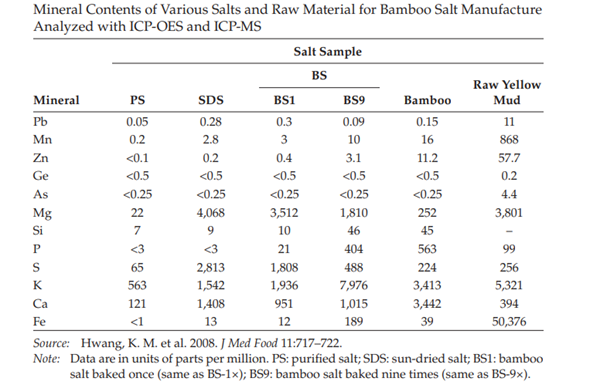
Moreover, the K content in BS9 was approximately fivefold higher than SDS. This is because the bamboo itself contains high K and P content. Plus, the yellow mud used to seal the bamboo tubes has high K, Mn and Fe levels, adding to its strength. Below we have discussed the positive impacts of these essential minerals on your body.
1. Potassium (K)
- Crucial for maintaining fluid balance and nerve impulses.
- Aids in muscle function, heart rhythm, and blood pressure regulation.
- Responsible for the synthesis of glycogen and protein
- Helps in the production of energy
- Deficiency symptoms include weakness of muscles, paralysis, diarrhea, impaired digestion, and headache.
2. Iron (Fe)
- Involved in oxygen transport within red blood cells.
- Supports energy production and immune system function.
- Deficiency Symptoms include anemia, anorexia, fatigue, and stomatitis.
3. Manganese (Mn)
- Participates in bone formation and antioxidant defense.
- Supports carbohydrate metabolism and nervous system health.
- Deficiency symptoms include shortening of bone length, infertility, bowed legs, and testicle involution.
4. Phosphorous (P)
- Aids in calcium metabolism
- Regulates parathyroid hormone
- Deficiency symptoms include loss of appetite, cognitive impairment, bone and joint issues, improper growth and development in children, etc.
5. Zinc (Zn)
- Regulates immune system function and aids wound healing.
- Contributes to cellular metabolism and DNA synthesis.
- Plays a crucial role in digestion, respiration, insulin secretion, and reproduction.
- Deficiency symptoms involve weight loss, pregnancy disorder, nonrestorative wound healing, and chances of anaphylaxis against various diseases.
Comparison of Bamboo Salt With other Salt Types
When it comes to salts, each variety holds its unique attributes. However, Bamboo salt, in particular, boasts a range of differentiating characteristics that make it stand out compared to other types. Let’s explore these standout features symbolizing it as a remarkable addition to our lives:
- Salts, in general, have the characteristic of inhibiting both bacterial and fungal growth. However, bamboo salt transcends your expectations by showing a surprising threshold against salmonella infection, making it a great alternative to medicines used to treat viral infections.
- Bamboo salt exhibits alkaline properties with a PH of 10.5, specifically due to high sulfate levels. It helps in the efficient neutralization of acidic food, relieving gastric discomfort. Moreover, the iron content in bamboo salt doesn’t oxidize like other salts that cause aging; rather, it involves some reduction phenomena to reduce anti-aging effects.
- Bamboo salt is produced by fire and carries a negative charge, unlike other salts that are positively charged and made with water. Hence, this negative charge aids in fighting environmental allergens keeping your body healthy for extended periods.
- Bamboo salt emerges as a health-conscious choice, devoid of toxins such as microplastics and heavy metals that pose risks to well-being. This safeguarding quality arises from exposure to elevated temperatures, effectively vaporizing the harmful compounds often found in other salt varieties.
Applications of Bamboo Salt
1. Antioxidative Property
Bamboo salt is a potent source of antioxidative prowess, a quality rooted in its mineral-rich composition and unique production process. Antioxidants facilitate the neutralization of harmful free radicals within the body, safeguarding cells from oxidative stress and potential damage. When bamboo salt is added to meals, they encounter reactive oxygen species in the body that cause cellular and genetic damage. As a result, our body gets immune from serious diseases and nourishes following a slow aging process.
In a study different salt samples were tested for their ability to scavenge DPPH radicals, which are harmful compounds. The results showed that purified salt, solar salt, and bamboo salt (1×, 3×, and 9×) exhibited scavenging activity against DPPH radicals. The scavenging activity also increased as the concentration increased from 5% to 25%.
Specifically, at 10% concentration:
- Purified salt showed 0.8% scavenging activity.
- Solar salt exhibited 1.2% scavenging activity.
- Bamboo salt (1×) displayed 7.6% scavenging activity.
- Bamboo salt (3×) had 11.4% scavenging activity.
- Bamboo salt (9×) demonstrated 18.4% scavenging activity.
At 20% concentration, similar patterns were observed with even higher values.
Surprisingly, the scavenging activity of bamboo salt (9×) surpassed that of bamboo salt (3×) and bamboo salt (1×), indicating its stronger potential. All bamboo salt samples showcased significantly better scavenging activity than solar and purified salt.
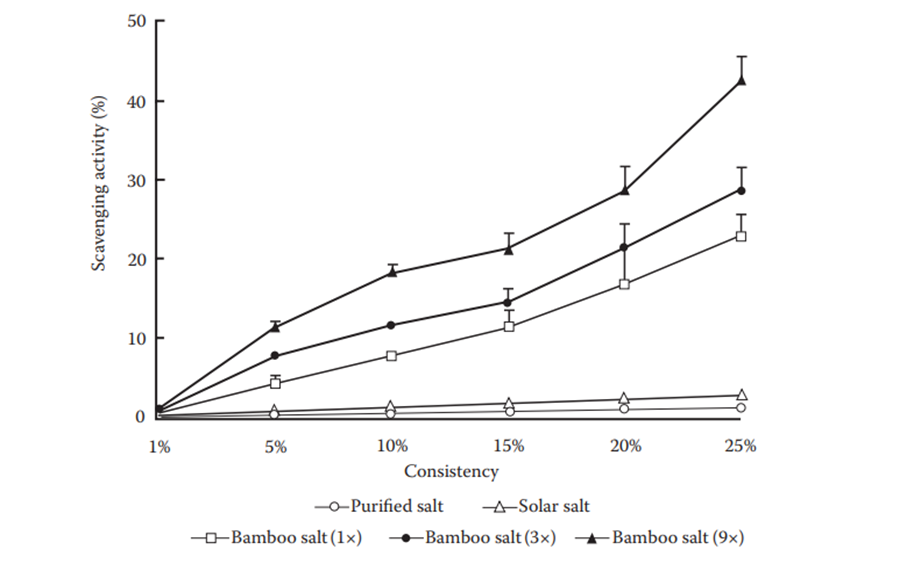
Fig: Scavenging Activity of different salt samples
These findings suggest that bamboo salt’s radical scavenging capability is notably more potent than that of purified salt and solar salt.
2. Anti-Cancer Effects
Beyond its role as a seasoning, bamboo salt has sparked interest for its potential anti-cancer properties. Some studies suggest that the minerals in bamboo salt might disrupt cancer cell growth and promote apoptosis, a natural cell death process that helps prevent uncontrolled cell multiplication.
As per the clinical investigation, sodium (Na) acts as a dietary carcinogenic element, while potassium (K) is an anticarcinogenic agent. Hence, by processing solar salt into bamboo salt, we can reduce the Na/K profile of salt to reduce the drastic effects of cancer.
3. Immune Enhancing Action
Our immune system is imperative in increasing our survival rate by acting as a barrier against pathogens and microbes. The immune system comprises innate and adaptive components that are compromised when a person is exposed to immunodeficiency disorders. One of the main reasons for compromised immune function is the deficiency of minerals that can be cooped using bamboo salt containing proper mineral profile.
The immune-boosting potential of bamboo salt was investigated in RAW264.7 macrophages( major cells of our immune system that combat the invasion of microorganisms in our body). Bamboo salt (BS) notably increased TNF-α levels by activating nuclear factor-κB in RAW 264.7 cells. These findings illuminate bamboo salt’s role in enhancing immune response, signifying its potential as a valuable contributor to overall well-being.
4. Anti-Allergic Effects
An allergy is an abnormal and exaggerated immune response triggered by exposure to environmental substances that are typically harmless to most individuals. These substances, known as allergens, can include pollen, dust mites, certain foods, pet dander, and various chemicals. The immune system mistakenly identifies these allergens as potential threats in individuals with allergies.
Thus, it initiates a defensive response, resulting in various symptoms and manifestations, such as itching, sneezing, runny nose, skin rashes, and swelling in severe cases. However, using bamboo salt as an effective anti-allergic agent, a person can naturally treat these symptoms with no side effects.
In a scientific experiment, bamboo salt showed anti-allergic effects by reducing ear swelling caused by mast cell-triggers allergic reactions.
5. Anti-Obesity Function
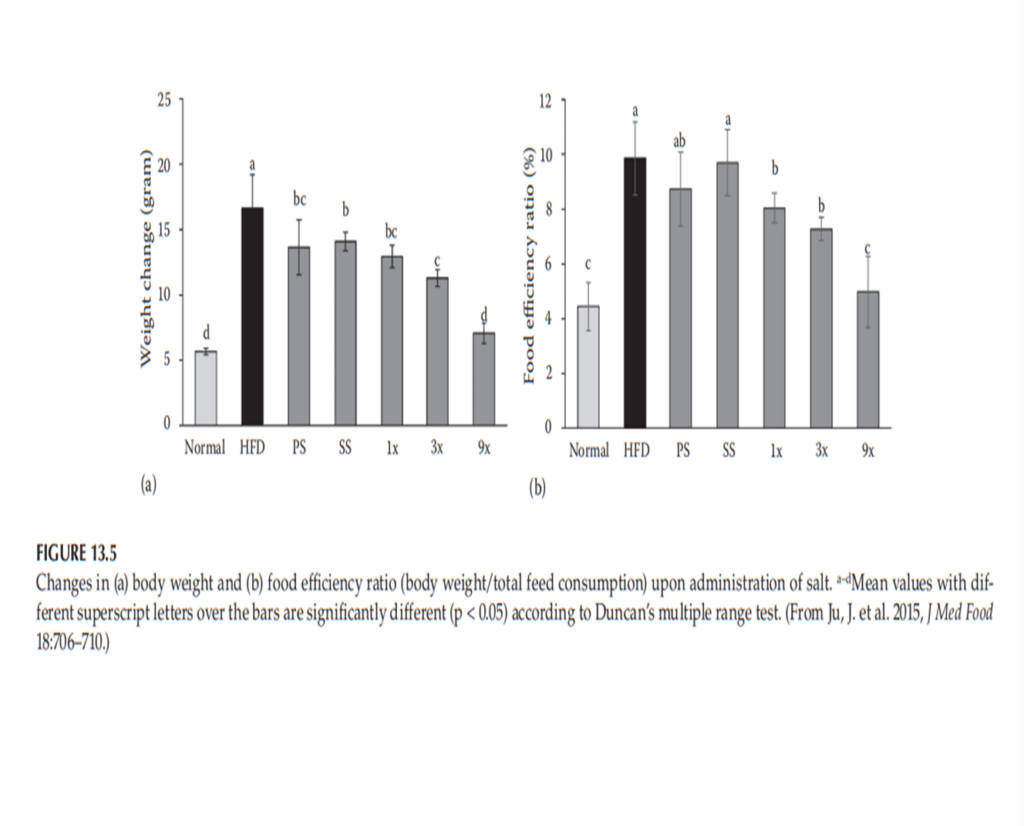
Obesity has been a leading concern for almost decades, and now it has affected approximately 30% of the total world population. It is a complex medical condition characterized by an excessive accumulation of body fat to a degree that leads to chronic diseases like diabetes, hypertension, cardiac myo infarction, etc. However, a person can still get rid of this lingering health disease by utilizing effective natural remedies, and bamboo salt stands out as the premium curing agent in this regard.
In a study, a high-fat diet (HFD) C57BL/6 model was utilized to investigate the effects of salt samples. The salt samples were orally administered at 2,727 mg/kg per day, equivalent to a daily dose of 10 g for a 60 kg human over 8 weeks.
The addition of salt samples led to significant reductions in the extent of weight change when compared to the HFD group (p < 0.05). Notably, the BS-9× group displayed the smallest body weight change among the salt-administered groups, nearly paralleling the normal diet group’s results.
6. Role in Curing Hypertension
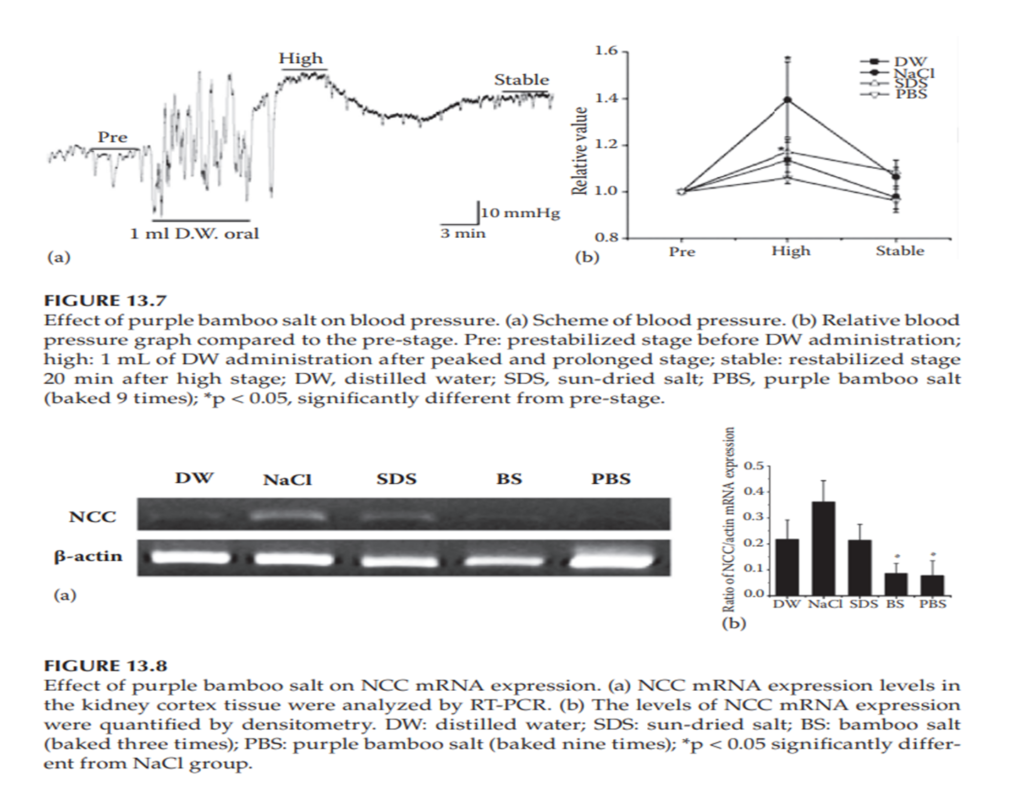
Bamboo salt has garnered attention for its potential role in managing hypertension, a condition characterized by persistently elevated blood pressure levels. Hypertension is a significant health concern worldwide, increasing the chances of cardiovascular diseases, stroke, and other related complications. However, the unique properties of bamboo salt, including its mineral content, can effectively control the disease.
Studies reveal that sodium is a key contributor to the development of type I hypertension. The Na+-Cl– cotransporter (NCC) is crucial in retaining sodium in the renal distal convoluted tubes. Increased NCC activity leads to sodium retention, closely linked to elevated blood pressure levels.
In a study involving hypertensive models, the effects of different salts on hypertension were examined. The models were orally administered purple bamboo salt, sun-dried salt, NaCl, or distilled water (DW, used as a control) for 8 weeks. The group receiving purple bamboo salt exhibited blood pressure levels similar to the DW group. In contrast, the sun-dried salt (solar salt) and NaCl groups experienced significant increases in blood pressure.
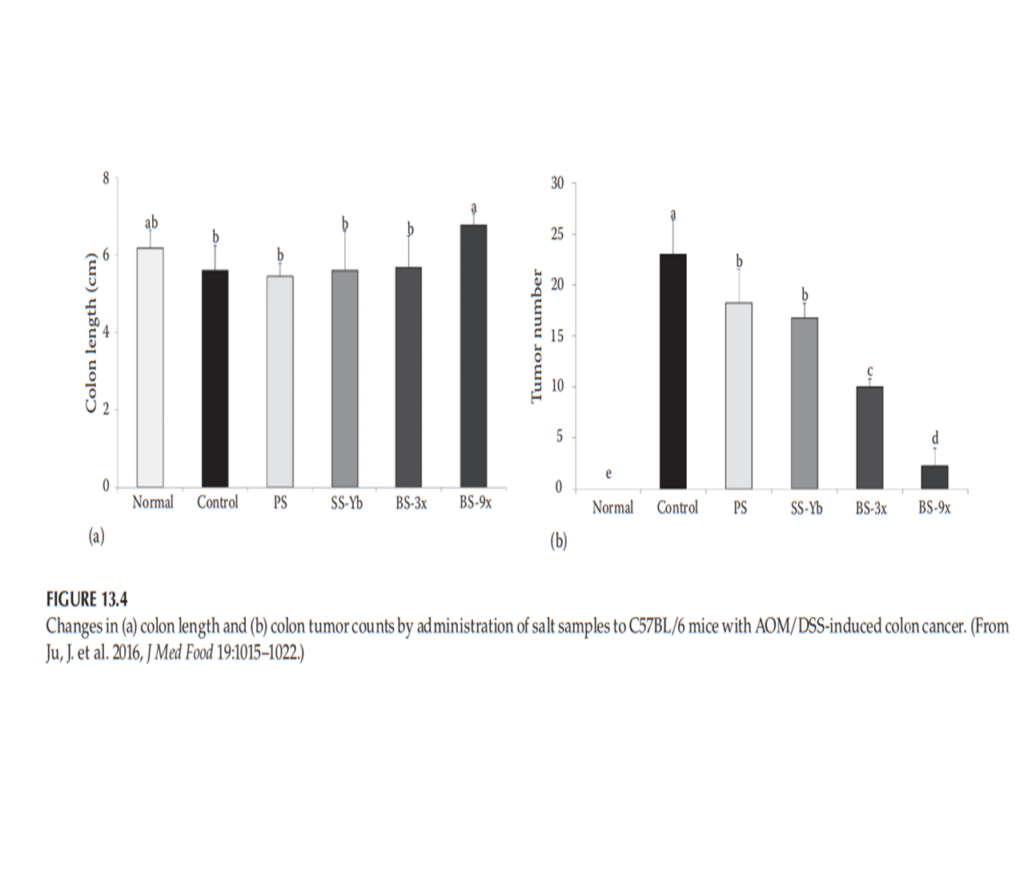
7. Antimicrobial Activity
Bamboo salt has gained attention for its potential antimicrobial properties, signifying its ability to inhibit the growth and activity of various microorganisms. This attribute is particularly relevant in the context of health and wellness, as controlling microbial populations can contribute to preventing various infections.
The antimicrobial activity of bamboo salt was evaluated using Salmonella enteritidis. Remarkably, the bamboo salt group’s oxidation-reduction potential and pH values maintained a reduced state (-105.7 to 52.5 mV) and an alkaline range (pH 8.4-9.3). This set it apart from other salt groups, such as refined, baked, processed, and sea salts, which exhibited oxidation (182.6-248.0 mV) and shifted toward acidic or neutral states (pH 5.5-7.8).
The minimum inhibitory concentration (MIC) values against Salmonella enteritidis were determined to be 5.0% for bamboo salt. In contrast, other salt types did not display such potent MIC values at 5.0%.
Hence, the insights highlight the bamboo salt’s distinctive ability to maintain its reduced and alkaline characteristics contributing to its remarkable antimicrobial effect against specific microorganisms.
8. Impact on Dental Care

Bamboo salt’s distinct mineral composition, obtained through its intricate processing stages, is a key factor contributing to its potential in dental care. Minerals such as magnesium, calcium and potassium are essential for maintaining strong teeth and promoting oral health. These minerals play pivotal roles in enamel remineralization, vital for combating tooth decay and erosion.
A study investigated the remineralization effect of a dentifrice containing bamboo salt and NaF on artificial caries-like enamel lesions, focusing on both surface and deep areas. Results showed that the dentifrice with bamboo salt and positive control enhanced surface hardness and reduced mineral loss in these enamel lesions. Additionally, the bamboo salt dentifrice demonstrated a reduction in lesion depth compared to both positive and negative control groups.
9. Resolve Skin Problems

Bamboo salt can also address various skin issues, ranging from minor irritations to more complex conditions. The mineral-rich nature of bamboo salt offers a soothing effect on skin irritations such as itching, redness, and inflammation. Its alkaline properties help balance the skin’s pH and alleviate discomfort caused by external factors.
In an experiment, scientists looked at how Bambusae caulis in Liquamen (BCL) – from heated bamboo stems can help with skin problems similar to atopic dermatitis. They used a model with induced skin issues caused by 2,4-dinitrochlorobenzene.
Consequently, BCL turned out to help reduce water loss, melanin production, and skin redness. These results show that BCL can ease the symptoms and reduce inflammation connected to skin issues like atopic dermatitis.
K-Lava Salt- Your Pathway to a Blissful Wellness Haven
Hence, going through the detailed analysis of bamboo salt above, you can truly witness its real-life benefits. So, if you have decided to embrace this essential mineral salt for culinary, therapeutic, and cleansing purposes, look no further than K-Lava Salt.
Acknowledged as a Food Grand Master for Bamboo Salt, K-Lava Salt is the exclusive brand name of the esteemed Insanga company.
So why delay? Take that vital stride towards enhanced well-being by integrating K-Lava Salt into your daily routines today.
Meta Description
Discover bamboo salt’s incredible health benefits and naturally elevate wellness with this unique mineral-rich solution.
Resources
- Oral health: Bamboo salt | British Dental Journal (nature.com)
- Bamboo Salt | The Highest Quality Salt on Earth (piorliving.com)
- Bamboo Salt: Everything You Need To Know (probacto.com)
- Jugyeom – Wikipedia
- CN103416715A – Improved method for bamboo salt production – Google Patents
- CN102578548A – Preparation process of nutritional bamboo salt – Google Patents
- What are Benefits of Bamboo Salt? » BAMBOO USES (gardenbambooplants.com)
- How to use bamboo salt – KOREASALT – There is a special salt in Korea!
- Bamboo Salt: Price, Nutrition, Benefits, Side Effects & All (todayhealthylife.com)
- What Is Bamboo Salt Used For? – Today Healthy Life
- Bamboo Salt: Everything You Need To Know (probacto.com)
- Oral health: Bamboo salt | British Dental Journal (nature.com)
- Alkaline and Antioxidant Effects of Bamboo Salt | Request PDF (researchgate.net)
- Elucidating how bamboo salt interacts with supported lipid membranes: influence of alkalinity on membrane fluidity | SpringerLink
- Bamboo Salt Vs Himalayan Salt: Differences, Uses & Benefits (saltean.com)
- Obesity and overweight (who.int)
- Anticancer and Antiinflammatory Effects of Bamboo Salt | Anticancer and Antiinflammatory Effects of Bamboo Salt (bookpi.org)
- Antimutagenic activity and in vitro anticancer effects of bamboo salt on HepG2 human hepatoma cells – PubMed (nih.gov)
- Bamboo Salt Benefits – Purple Life Bamboo Salt (yourpurplelife.com)
- Bamboo salt and high blood pressure – HKIII (hk3.com.my)
- How to use bamboo salt – KOREASALT – There is a special salt in Korea!
- Depth of Penetration and Antimicrobial Activity of 5% and 10% Bamboo Salt, 2% Chlorhexidine Gel and Calcium Hydroxide Against Enterococcus faecalis – An In Vitro Study – PMC (nih.gov)
- 08-The(JE) (koreasalt.com)
K-Lava
Best Selling Products
-
 SEASEAL 9x BAMBOO SALT Firming Cream
$52.80Rated 0 out of 5
SEASEAL 9x BAMBOO SALT Firming Cream
$52.80Rated 0 out of 5 -
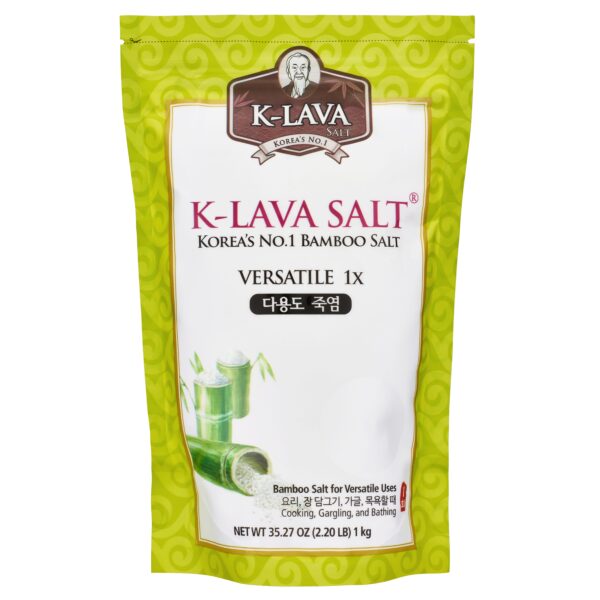 K-LAVA SALT—Bamboo Salt Versatile 1x, Powder, 35.27 Ounce
$42.96Rated 0 out of 5
K-LAVA SALT—Bamboo Salt Versatile 1x, Powder, 35.27 Ounce
$42.96Rated 0 out of 5 -
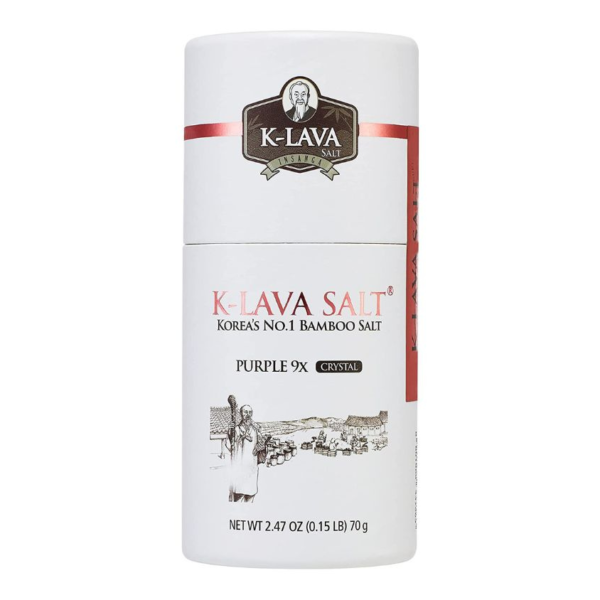 Bamboo Salt K-LAVA SALT—Purple 9x, Crystal, 2.47 Ounce
$31.50Rated 0 out of 5
Bamboo Salt K-LAVA SALT—Purple 9x, Crystal, 2.47 Ounce
$31.50Rated 0 out of 5 -
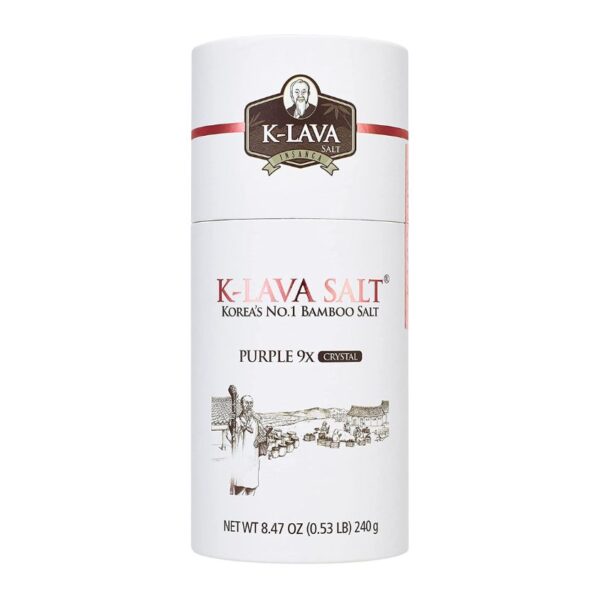 Bamboo Salt K-LAVA SALT—Purple 9x, Crystal, 8.47 Ounce
$98.00Rated 0 out of 5
Bamboo Salt K-LAVA SALT—Purple 9x, Crystal, 8.47 Ounce
$98.00Rated 0 out of 5 -
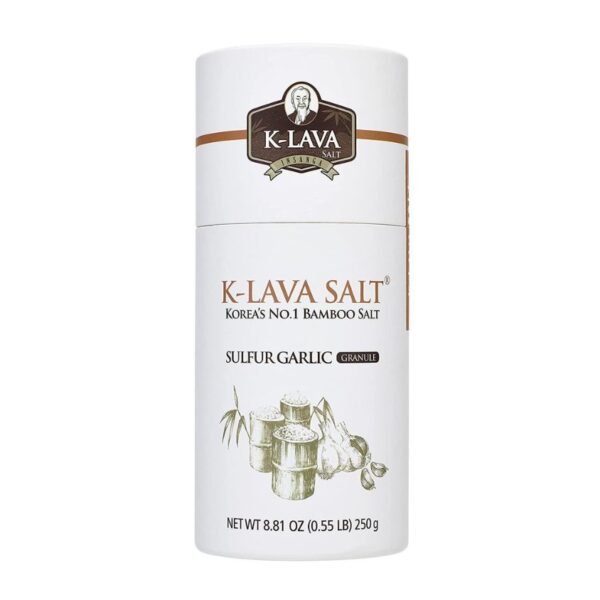 Bamboo Salt K-LAVA SALT—Sulfur Garlic, Granule, 8.81 Ounce
$80.00Rated 0 out of 5
Bamboo Salt K-LAVA SALT—Sulfur Garlic, Granule, 8.81 Ounce
$80.00Rated 0 out of 5 -
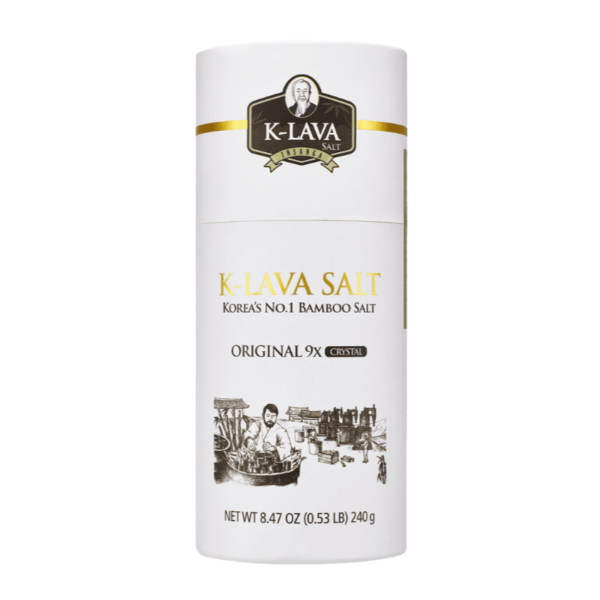 Bamboo Salt K-LAVA SALT—Original 9x bamboo salt, Crystal, 8.47 Ounce
$77.00Rated 0 out of 5
Bamboo Salt K-LAVA SALT—Original 9x bamboo salt, Crystal, 8.47 Ounce
$77.00Rated 0 out of 5 -
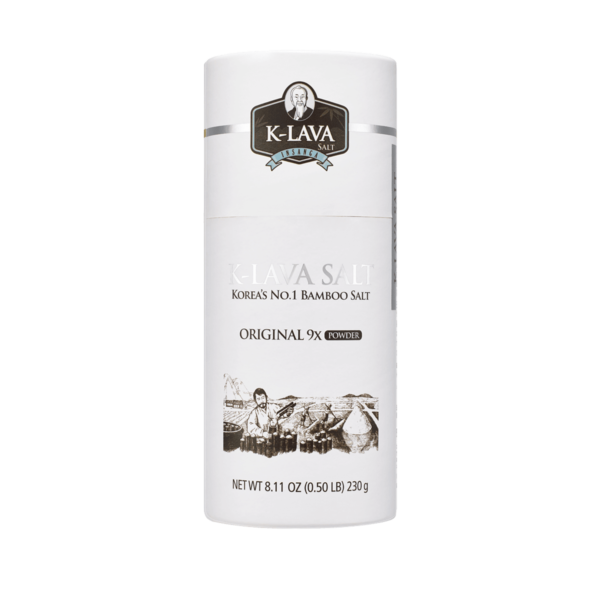 Bamboo Salt K-LAVA SALT—Original 9x, Powder, 8.11 Ounce
$70.00Rated 0 out of 5
Bamboo Salt K-LAVA SALT—Original 9x, Powder, 8.11 Ounce
$70.00Rated 0 out of 5 -
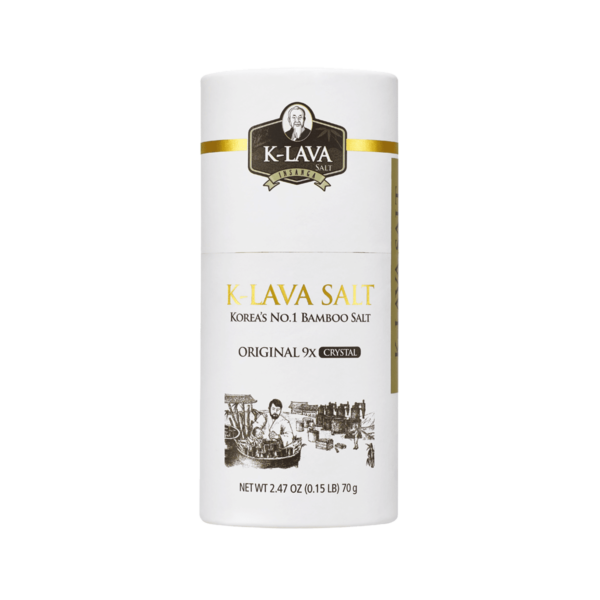 Bamboo Salt K-LAVA SALT—Original 9x, Crystal, 2.47 Ounce
$24.94Rated 0 out of 5
Bamboo Salt K-LAVA SALT—Original 9x, Crystal, 2.47 Ounce
$24.94Rated 0 out of 5 -
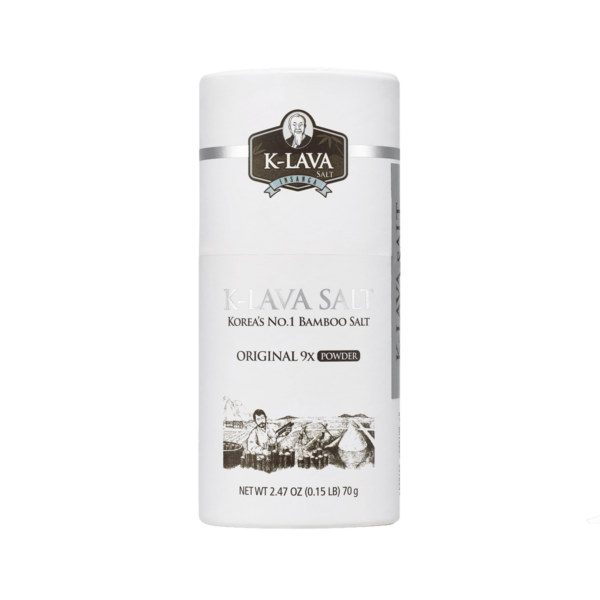 Bamboo Salt K-LAVA SALT—Original 9x, Powder, 2.47 Ounce
$24.94Rated 0 out of 5
Bamboo Salt K-LAVA SALT—Original 9x, Powder, 2.47 Ounce
$24.94Rated 0 out of 5 -
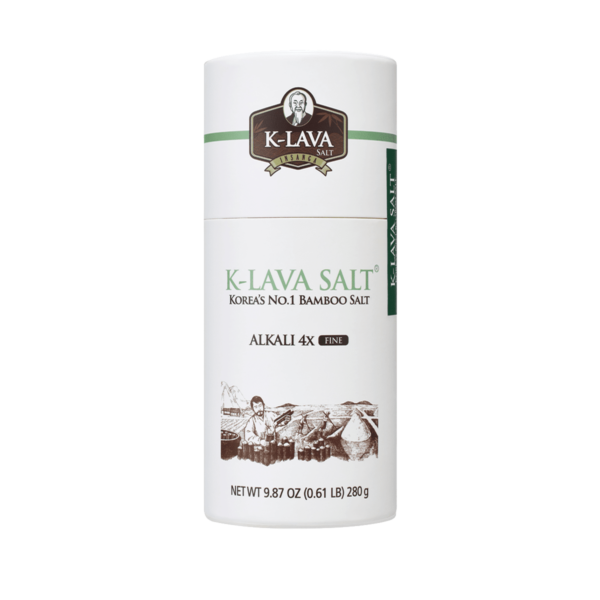 Bamboo Salt K-LAVA SALT—Alkali 4x, Fine, 9.87 Ounce
$26.94Rated 0 out of 5
Bamboo Salt K-LAVA SALT—Alkali 4x, Fine, 9.87 Ounce
$26.94Rated 0 out of 5
Best Selling Products
-
 Seaseal—BAMBOO SALT TOOTHPASTE
$11.00Rated 0 out of 5
Seaseal—BAMBOO SALT TOOTHPASTE
$11.00Rated 0 out of 5 -
 Bamboo Salt K-LAVA SALT—Original 9x bamboo salt, Crystal, 8.47 Ounce
$77.00Rated 0 out of 5
Bamboo Salt K-LAVA SALT—Original 9x bamboo salt, Crystal, 8.47 Ounce
$77.00Rated 0 out of 5 -
 Bamboo Salt K-LAVA SALT—Original 9x, Powder, 2.47 Ounce
$24.94Rated 0 out of 5
Bamboo Salt K-LAVA SALT—Original 9x, Powder, 2.47 Ounce
$24.94Rated 0 out of 5 -
 Bamboo Salt K-LAVA SALT—Purple 9x, Crystal, 2.47 Ounce
$31.50Rated 0 out of 5
Bamboo Salt K-LAVA SALT—Purple 9x, Crystal, 2.47 Ounce
$31.50Rated 0 out of 5 -
 Bamboo Salt K-LAVA SALT—Purple 9x, Crystal, 8.47 Ounce
$98.00Rated 0 out of 5
Bamboo Salt K-LAVA SALT—Purple 9x, Crystal, 8.47 Ounce
$98.00Rated 0 out of 5
